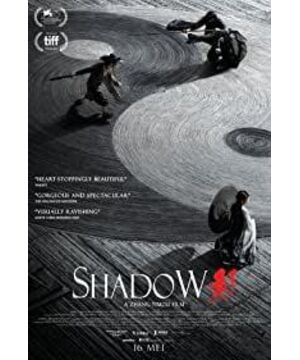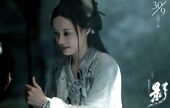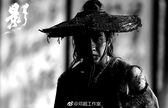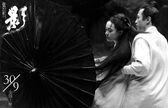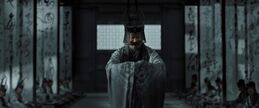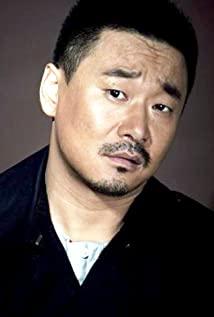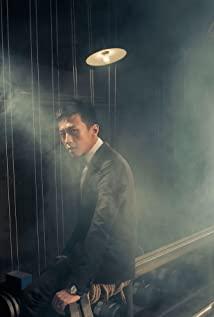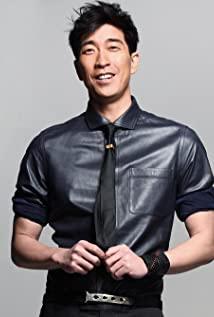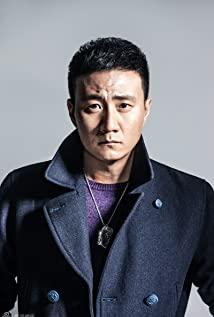Zhang Yimou 's new work "Shadow" was released on the eve of the National Day. The word of mouth is not perfect, but it is obviously better than "The Great Wall", especially overseas media have also given praise.
"Shadow" is a black and white costume film. The scene is not grand, but in a literary tone, it tells about a bloody palace fight about "substitutes" in the alternate history.
In fact, the concept of "substitute" is a tribute to Akira Kurosawa's "Shadow Warrior" , but this time the story is completely new.
The script of "Shadow" originated from Zhu Sujin's novel "Three Kingdoms: Jingzhou" , which originally told the story of Guan Yu's careless loss of Jingzhou. In Zhang Yimou's project, in the hands of screenwriter Li Wei, it became a fictional legend of an alternate historical dynasty. This change, on the one hand, can avoid the censorship of major historical themes, and on the other hand, it is convenient for Zhang Yimou to infuse a large number of symbols and codes of Chinese culture in it, without being hampered by history...
Therefore, his film has little to do with Jingzhou in the Three Kingdoms, but "the drunkard's intention is not to drink."
The film opens on September 30. Li Zong had already seen the internal preview about a month ago.
Therefore, this article has been wanted and should be written for a long time, but considering the requirements of the organizer, it can only be publicly written after the film is officially released...
Now, let me reveal for you some of the "codes" of traditional Chinese culture hidden in "Shadow" .
Although the characters, plot, etc. of this film are not perfect in terms of commercial film itself, but from the standpoint of traditional cultural research, because this film uses a lot of symbols, symbols and subtexts related to "Book of Changes", my personal evaluation is Very nice. "Shadow" can be used as a "stepping stone" to understand the I Ching culture, depending on whether you are interested in interpreting it.
So I list the following "Easter Eggs" for your reference when watching the movie or even a second brush.
1. Jingzhou
Jingzhou in the Three Kingdoms period was changed to " Jingzhou" in "Shadow" . As the two opposing sides of national forces, they have also been changed to "Pei Kingdom" and "Yan Kingdom" . This change, on the surface, is a new code name, but in fact it hides a traditional culture's five elements and gram structure.
"Jing" is the edge of the word "earth", which represents the border, the country, and the five elements naturally belong to the earth. In the same way, "Yan" refers to fire, while "Pei" refers to water. In the Five Elements, water and fire are incompatible, and they are mutually antagonistic. In particular, water can overcome fire - this is the principle of "mutual restraint". But from the point of view of "mutual generation", fire can generate soil, and soil can control water, and soil forms a layer of protection for fire, becoming a kind of "balance of power".
Therefore, in the background of the film, the Pei Kingdom and the Yan Kingdom are two opposing countries, but the Pei Kingdom has never dared to attack the Yan Kingdom because the latter has occupied a disputed land-Jingzhou, which is a natural danger. place. In such a pattern, water and fire are incompatible, water itself overcomes fire, and fire produces earth to overcome water, and it becomes a stalemate...
From the details of this name change alone, it can be seen that Zhang Yimou's team has worked hard on traditional culture, and it is by no means as simple as making up a few flower names.
2. Aqua
"Pe" in Pei's country refers to water. Ziyu, a general of the Pei Kingdom who was keen to recapture Jingzhou, the "Zi" in his name is in the zodiac, and also belongs to water.
"Shadow" is a water-related film, and most of the scenes in the film are shrouded in a solemn mist and rain. The film uses black as the theme color, not to pay tribute to "Kurozawa Akira", but because the color of "water" in the five elements is just black.
Gold, wood, water, fire, and soil correspond to white, blue, black, red, and yellow respectively. These five colors come from the ancient star-gazing qi, and are also the origin of the divine beasts such as Qinglong, White Tiger, Suzaku, Xuanwu, and Teng Snake. The water is the main black, which is where Xuanwu is located. Water is also the master of wisdom and strategy, so "Shadow" is also a "gongdou drama" with a black theme.
Looking at Zhang Yimou's previous blockbusters in ancient costumes - "Heroes", the red silk and satin belong to the fire. "House of Flying Daggers" is full of green bamboos, which belong to wood. "The whole city is full of gold armor", of course, is gold. "The Great Wall" is about the imperial capital, the city wall, and it belongs to the earth. And the latest "Shadow" belongs to water. These five films are linked together to form a "five-part series" by Zhang Yimou... Have you found this password?
Therefore, no matter how his films are made, it is well-deserved to say that he is a model of exporting traditional Chinese culture overseas, because you can't find anything better than him. (I know some people will say Ang Lee, but Ang Lee is not pure oriental, but a complex combination of East and West, so it is not comparable)
3. Solving the hexagrams (high energy in front)
At the beginning of the film, the witch played by Sun Li made a claim for King Pei. She put three copper coins in the turtle shell, shook it, and then tossed it—six times in a row from a professional point of view—to get a "dry" hexagram.
Sun Li said: "This hexagram is masculine and strong, and there is no place for women."
The "Qian" hexagram is the head of the 64 hexagrams of Zhouyi, representing the position of "heaven". Each hexagram of Zhouyi has six lines (six horizontal lines, all solid or dashed, representing yang or yin), and "gan" is the only six lines that are all yang, so it is "to yang to strong", "nothing". woman's place".
Among Yin and Yang, "Yang" represents masculinity, movement, and positivity. The "gan" hexagram, whose six lines are all yang, also represents "the Son of Heaven" and "king power". The film "Shadow" tells the story of the court struggle, which eventually developed to the slaughter of the monarch, which is a struggle for the "Son of Heaven" and "The King's Way". Therefore, for Sun Li to shake out the "dry" hexagram at the beginning, it is a direct hint to the follow-up plot to those who understand the logic.
This is the first layer and the most elementary layer.
Is there a second floor?
What Sun Li shakes out at the beginning is the second hexagram!
She went on to say: "It only takes seven days of continuous rain, and the flood will prevail." This line really determines the entire strategy of King Pei (Zheng Kai) and the general Zi Yu (Deng Chao)...
But if you look at the original text of the "Book of Changes", you will find that in the "dry" hexagram, there is no such thing as "just seven days of continuous rain, and the water will prevail"! So how did Sun Li come to this conclusion?
Let's get real.
Sun Li's divination method is to shake copper coins with tortoise shells, which is commonly known as "money hexagram", also known as "Wen Wang hexagram". Shake it six times and throw out three coins each time. According to the distribution of the positive and negative sides, it is judged whether the line belongs to yin or yang. If there are more positives than negatives, it is yang, otherwise it is yin. Sun Li got Zhiyang's "Dry" hexagram. Obviously, the three copper coins she shakes out each time, after landing, there are more heads than tails.
But wait a minute - there are more heads than tails, and there are two cases: two heads and one tail, or three heads. Both belong to "Yang", but if you look closely, they have different meanings! Because there is an important point of view in the Zhouyi system, that is, the extremes of things will reverse (the Tao Te Ching also has this theory) - if the yang qi reaches the extreme, it will go to the opposite side of things, and the "yang" has the possibility of mutating into "yin"!
That is to say, if Sun Li threw a copper coin at a certain line, and all three were positive, that is, the line of ultimate yang, then this line would become the "moving line" or "move" in the terminology, which will be used in the future. When the stage changes from yang to yin, then the "Qian" hexagram has the possibility of becoming another hexagram image. The "another hexagram image" here is the "change hexagram" in the terminology .
We sometimes say that this person changed his mind halfway through. This phrase "change hexagram" is derived from the term "change hexagram" in the Book of Changes. All people and things are changing. The reason why the "Book of Changes" is translated as the Book of Change stems from this "change of hexagrams".
Well, if Sun Li had a "change of hexagram" in the process of starting the hexagram, then which hexagram in the remaining 63 hexagrams of Zhouyi did it become?
It is not stated in the video. However, in Sun Li's lines, it is mentioned that "just need" and "water will prevail" - these keywords allow us to easily target the fifth hexagram in the "Book of Changes" sequence - the "need" hexagram .
The upper hexagram of the "Need" hexagram is water (Kan☵), and the lower hexagram is still Tian (gan☰). The rhetoric of this hexagram is "Need, have Fu, Guangheng, Zhenji. Benefit from the Great River." "Need" also means waiting, which means that we must wait until the time is right before we can act. And then look at the hexagram shape, the water is above and the sky is below, you can immediately understand why Sun Li made the conclusion that "it only takes seven days of continuous rain, and the water will prevail" !
From this, we can solve it in reverse - the order in which Sun Li threw the copper coins with the turtle shell must be positive and negative, positive and negative, positive and negative, positive and positive, positive and negative, and positive and negative.
From bottom to top, rising out of yang, yang, yang, maximal yang, yang, maximal yang, that is, "dry becomes heaven" and becomes "water and heaven need".
The fourth and sixth lines of this hexagram "Qian" are activated, and the corresponding lines are "Nine four: or leap into the deep."
And if you refer to the plot, "or jumping in the abyss" is reflected in the development stage when the stand-in protagonist breaks through the barrier and finally achieves the goal; "Kanglong has regrets" is reflected in the stubbornness of King Pei, the general Zi Yu and others, and finally unexpectedly happened The murderous situation...you can appreciate the meticulous logic of the main creators!
At this point, the solution is complete.
It's just that most film critics can't see this "level" at all.
4. Yin Yang
The posters of "Shadow", as well as the important scenes in the film, directly reflect the "Yin Yang Tai Chi" , a visual element with Chinese connotations.
Of course, everyone knows that "Tai Chi" is a Chinese element, but how many people can say more? If it only stays on a superficial aesthetic, it will inevitably be swallowed up and superficial. Most of the current film reviews of "Shadow" only mention "Yin Yang Tai Chi" in one stroke, and it ends in a sloppy manner, which makes people feel a little regretful.
Many people think that "Yin Yang Tai Chi" is just a totem of folk Taoism. But in fact, it was born before the birth of all religions, and is the product of ancient civilization (the age of mythology).
The philosophy of "yin and yang", like light and darkness, order and chaos, is a dualistic division of all things in the world. "Yang" is active, symbolizing energy, positivity, and light; "Yin" is calm, symbolizing material, negativity, and darkness. In the numerology system, people with yang and yin characters will also have the above-mentioned character characteristics to some extent.
But the greatness of the Chinese is that, unlike Western civilization, we do not regard light and darkness, order and chaos as complete opposites, but believe that there is not a complete separation between "yang" and "yin", but a This kind of "mutual transformation" is what we mentioned earlier as the positive and the negative, and the negative and the positive, which is the "extremes of things will reverse" as mentioned in the Tao Te Ching.
The reason why the movie "Shadow" is not about drinking alcohol is that it does not really want to tell the history of "Three Kingdoms: Jingzhou", but only uses this theme to really express the deep-rooted Chinese character. The concept of yin and yang - everyone has both a yang side and a yin side. Therefore, Chinese expressions often have more subtexts than Western languages. When communicating with Chinese people, you often have to carefully ponder the different "double meanings" on the outside and inside. There are even some people who "follow the yang and go against the yin"... No matter whether you understand it or not, This is a kind of nationality deeply hidden in the blood of the Chinese people, derived from "yin and yang".
If foreigners don't understand the general character of Chinese people, they can look at "Shadow" by Ang Lee or Zhang Yimou. Ang Lee's approach is to put the cultural differences between the East and the West directly on the table; while Zhang Yimou's "Shadow" is a directional blasting, directly at the home of the East, with a male "Palace Fight" to tell you What happened to yin and yang.
Therefore, the setting of some plots and bridges in "Shadow" may be a relatively elementary level in the eyes of domestic audiences who are used to watching Gongdou dramas. But if you look at the global market, Zhang Yimou made such an arrangement and decision, obviously with his intention to communicate with the "world"...
5. Black and white
The costumes and props of this film are heavily used in black and white monochrome. This is actually to interpret the "yin and yang" philosophy mentioned above.
White represents light and belongs to yang. Black represents darkness and is yin.
At the beginning of "Shadow", there are such details - Deng Chao's "substitute", when he met King Pei, he was wearing black as a general, and King Pei was wearing white. In this scene, Deng Chao is yin, while Pei Wang is yang. The latter, as a king, is high above, of course, in the position of the Son of Heaven's Zhiyang "Gan". And Deng Chao, as an assistant general, is in a submissive position, which is naturally yin.
But in the next scene, the "substitute" returned home to see the real body of the "general" - with Deng Chao playing the two roles - the color of the clothes changed, the "substitute" changed into white clothes, and The "Great General" who lives in the cave is dressed in black. At this moment, the "substitute" is responsible for the work of the outside world in the light, and belongs to the yang; the "general" himself controls everything in the dark, and naturally belongs to the yin! The conversion between yin and yang is directly reflected in the clothing colors of the characters in each scene, expressing a strong sense of careful design.
As the monarch of Pei, King Pei, played by Zheng Kai, also changes black and white clothes back and forth on various occasions. This King Pei, who looks like a condescending man, actually has ulterior motives and is full of murderous intentions. Due to his "work needs" in his position, he also needs to make different "performances" and "arrangements" according to different occasions - even in some scenes with strong dramatic tension, the clothes on Pei Wang's body will appear black, The interpenetrating and intertwining dazzling smudges of the two colors of white are indistinguishable... This kind of "mixing of yin and yang" and even "weird qi of yin and yang" symbolizes a complex "monarchy", which makes people not aware of it.
If you understand the corresponding relationship between this color and yin and yang, in every scene of "Shadow", you can understand the director's intention of the current scene just by the color of the characters' clothes. Zhang Yimou has also done a lot of work in these details.
6. Universe
The biggest attraction of the action scene of "Shadow" is that Deng Chao uses the "umbrella" as a weapon to fight against Hu Jun (General Yang who plays the Yan Kingdom) "big sword" - and the prototype of the latter is Guan Yu in the Romance of the Three Kingdoms The Qinglong Yanyue Sword .
This film is related to water, so it is natural to use the "umbrella" as a weapon. Hu Jun's "Yang Family Swordsmanship" is invincible in the world, but Deng Chao's wife, Sun Li, realizes the solution to the "umbrella" - entering the battle in the form of a woman, "using softness to overcome strength".
Why can Rou overcome Gang? In fact, rigidity is yang and softness is yin. The principle of "softness overcomes rigidity" is actually what we said before, "yin is born from the positive". When a person is too masculine, he is actually in a dangerous situation himself - the extreme yang may become the extreme yin at any time, and there is a risk of being "turned against the wind" by the opponent every minute.
The reason why the script changed the original Guan Yu to General Yang is because "Yang" sounds like "Yang". General Yang, played by Hu Jun, is invincible and invincible with the Yang family's swordsmanship. Of course, it is a manifestation of "Zhiyang". And Deng Chao learned from Sun Li, a woman, to use the feminine power of an umbrella to restrain Hu Jun's swordsmanship of the sun—not directly hitting hard, but following the opponent's situation and using strength to finally let Hu Jun I lost control of the steel knife. So we saw that in the "Waltz" under the gorgeous slow motion, the steel knife was swept away by the umbrella, and Deng Chao finally succeeded in defeating the Gang with softness!
To put it bluntly, this is a trick similar to the "Tai Chi Chuan" that Jack Ma is good at .
But the cleverness of the script is that while Deng Chao defeated his opponent with "softness and strength", he was also seriously injured and bleeded to the ground. Why not let Deng Chao defeat his opponent perfectly, instead of hurting himself?
This is because, although the yang creates the yin and the soft can overcome the rigid, the ultimate outcome of the battle between yin and yang with extremely strong energy can only be "both losers" !
In the Book of Changes, the hexagram of the most yang is "Gan is the sky", and the hexagram of the most yin is "Kun is the earth". The six lines of "Kun" are all pure yin, which is both the partner of "Qian" and the opposite of "Qian". The yin and yang change each other, the opposites are unified, and the world is constantly changing.
"Qian" represents heaven, kingship, master, father, and husband, and belongs to yang; "Kun" represents earth, ministers, servants, mothers, and wives, and belongs to yin.
In the film "Shadow", the main line is the "conflict between ruler and minister" above the court, the sub-line is the "conflict between master and servant" between the general and the substitute , and the "conflict between husband and wife" between Deng Chao and Sun Li . These three contradictions can all be explained by the yin and yang opposition of "Qian" and "Kun".
Contradictions between monarchs and ministers - the monarch is self-willed, and the generals conspire to replace him. It is "Yang" that flourishes and declines, and "Yin" will fight against "Yang".
Conflict between master and servant - the substitute gradually became out of control, and the master began to murder; and the substitute gradually saw the master's weakening, and decided to completely counterattack. The two refer to each other as "yin" and "yang" on different occasions, and it is difficult to tell them apart.
Contradictions between husband and wife - Sun Li has always been obedient to Deng Chao (the general himself), but after learning about part of the latter's conspiracy, and in addition to being in love with the substitute, she slowly developed a heart of resistance, and finally deduced a later period of two people "Douqin" - Qinse no longer chirped in harmony, but confronted each other in court. Here, it is "the negative and the positive", which makes things pour and slide in an irreversible direction...
These three groups of contradictions brewed to the extreme, and finally broke out suddenly during the duel between Deng Chao and Hu Jun.
In the Book of Changes, whether "Qian" or "Kun" develops to the extreme, it will encounter unexpected events and usher in disaster. The extreme of the former is "a stubborn dragon has regrets" , and the extreme of the latter is "a dragon fights in the wild, its blood is dark yellow" .
These two hexagrams were revealed in the fierce duel between the umbrella and the steel knife.
Although General Yang (Hu Jun) killed himself in the duel, the swordsmanship was broken by the umbrella in the end. And when he turned around, he found that the flag with the prefix "Yang" was cut off, the city was destroyed, and he carelessly lost Jingzhou - "Yang" sounds like "yang", and the scene where the flag was cut was clearly a "Kanglong has regrets"!
And look at Deng Chao again. Although he entered the battle in the form of a woman and used a feminine umbrella to crack Hu Jun's invincible swordsmanship, he was also seriously injured, "the dragon fights in the wild, and its blood is black and yellow" . When the city of Jingzhou is broken, he thinks he can be reunited with his mother, but finds that the old mother has been killed - the "Kun" hexagram represents the mother. The client developed to the extreme and prosperous, but the mother suffered an accident. Why does the script have to set his mother to be killed? Do you understand it here?
In the "Book of Changes", the "Qian " hexagram develops to be too prosperous, and the top line is positive and yin is born . "夬" means unexpected, there will be drastic changes. General Yang Kanglong had regrets and thought that he was invincible in the world. Not only his swordsmanship was broken, but he also lost the city, his son died in battle, and he sacrificed himself. Kang Long, the general of Ziyu, has regrets and thinks that the situation is in his own strategizing, but he was killed by the substitute, and his success was in vain. King Pei Kanglong has regrets and thought he could take the opportunity to get rid of the serious troubles of his confidants, but found that the plot took a sharp turn, everyone lost control, and finally he was killed... Kanglong has regrets, but he lost to a "full of thought" !
The top line of the "Kun" hexagram is activated, which is "the dragon fights in the wild, its blood is dark yellow" . The power of yin has developed to the extreme, and it is unwilling to submit to yang any more, but instead has to resist and replace it. The resulting war between heaven and earth caused both losses and blood flow. The resulting change is "Peeling" , which means peeling off, peeling off, and all people and things have been shaken. Zhang Yimou made Deng Chao, after defeating the enemy, covered with scars and bloodstains all over his body, and even some deliberate expressions in art are actually just a "peeling" image. A counter-attack by a substitute caused the entire dynasty to collapse. And Deng Chao's own mother was killed, and he had to embark on the road of Shura, which is also the fate of "Dragon Fighting in the Wild" . After Sun Li's emotional changes, "fighting the piano" with her husband is also a kind of appearance of "the dragon fighting in the wild". The feminine Pei Kingdom is going to attack the masculine Yan Kingdom, isn't it a kind of "dragon fighting against the wild"?
The ending of the Yin-Yang War is that in the end everyone is disappointed and deviates from their original expectations. The whole "Shadow" tells the story of yin increasing and yang decreasing. In the end, yin is going to attack yang, causing violent conflict and an unexpected ending...
You have to see this level in order to really understand the creative intentions of Zhang Yimou's team (not the one that the film critics swallowed whole).
7. Timeliness
Zhang Yimou's "Shadow" has its epochal character.
Many film works often have an amazing "prophecy" effect on the development of history, social changes and even international trends.
And this kind of "prophecy" or what people call "epochal" is not necessarily completely presupposed by film creators, but often because they are deeply influenced by the current era. consciously express...
So, what is the contemporary nature of Zhang Yimou's "Shadow"?
Li always thought that what this film is about, or what it wants to foreshadow, is that in the current world, the power of "yin" is rising, a new situation, or even a "new normal", that is gradually competing with "yang".
What are the "new normals"?
Just a few years ago, a computer game featuring "Battle Royale" took the world by storm. In this game, players need to kill each other, and the one who survives to the end is the real winner. In the eyes of players, this seemingly rebellious setting is a refreshing and extraordinary paradise; but in the eyes of the Yin-Yang family, this is a completely "yin" worldview. And the line "Eat chicken tonight" promoted by this game - "night" is yin, and "chicken" is also a feminine animal. This "PUBG Mobile" is completely a portrayal of a negative worldview!
In the capital market, cryptocurrencies led by Bitcoin (BTC) are very popular. This digital currency is characterized by anonymity and is most suitable for secret transactions, so it became the main transaction currency for many "darknets" in the early days. In the past two years, this cryptocurrency has become even more aggressive, and in many fields, it has to compete with traditional fiat currencies (US dollar, RMB, etc.), thus causing a series of regulatory crises. Such currency, compared with fiat currency, is of course "yin". If the negative currency wants to replace the positive currency, it will naturally lead to "the dragon fights in the wild, its blood is black and yellow"...
At the social level, the women's movement with the slogan "Me Too" is developing and spreading all over the world, almost becoming a prairie prairie. Every month, we seem to hear that in a certain area, a famous man is accused by a woman, exposed, and then planted at the hands of a woman... Fairness and justice are of course necessary, but we also know that women are " "Yin", while men belong to "yang", the women's movement represented by "Me Too" happens to be the power of "yin" sex on the rise...
At the international level, what everyone is most concerned about at the moment is the "China-US trade dispute" or simply the "China-US dispute". China and the United States used to have a very good honeymoon period, but now they seem to have a tense relationship, and even glares at each other - you know, in some contexts, the relationship between China and the United States was likened to "the way of husband and wife"! In this past "husband and wife" relationship, it was clear that America was "yang" and China was "yin". In the current situation, it is also after the power of "Yin" is strong enough to a certain extent, which triggers the scruples of "Yang". "…
And if you look at state-to-state relations all over the world, doubts and contradictions arose, and the conservative "yin" forces were increasingly dominant...
So, did you see it?
In the current era, the power of "yin" is on the rise. It is an inevitable situation in which the power of yin and yang will increase and decrease after the development of the time cycle to a certain stage.
In this context, the birth of "Shadow" with the I Ching as its subtext can of course be considered to have a unique "epoch".
The Sino-US confrontation is about to enter a formal stage. And Zhang Yimou handed over the work "Shadow" at this time and participated in international exchanges... Even if he himself did not have much intentions, it was time and force. Zhang Yimou's eight-character sun column "Dingmao", in the current "Renxu" flowing moon, is also destined to encounter "the combination of heaven and earth"...
When you see a Tai Chi picture, you say it is classical and Chinese. But in my opinion, this is an uncompromising piece of "contemporary art".
Some people say that he piled up Chinese symbols to the point of flooding. But I think this is because the complainers themselves do not have enough ability to understand Chinese culture. He can't see those subtexts and complicated texts, so he can only pick on the visual aesthetics, thinking it's just a routine.
And I think that Zhang Yimou's most brilliant thing this time is that he implanted a lot of thinking about the "Book of Changes", but in all commercial promotions, he never took the initiative to talk about this, just waiting for people who can understand it. Find out for yourself...
Seeing through and not speaking is the artist's cultivation, and it is also a kind of wisdom for social survival.
As an ordinary audience, why did Li Zong take the effort to write the above text to help you disassemble it, because I hope that everyone, especially young friends, will be familiar with every episode of Hollywood's "Avengers". , I can also understand and even be touched by these "cultural stalks" buried in Chinese-style movies. Only in this way can Chinese-language films truly have a future, and Chinese culture can have hope.
So, did you finally get it?
This article was first published on the WeChat public account "Li Zongshuo".
The author is Mr. Li, the founder of Jiazi Research Institute, a well-known horoscope and numerology blogger certified by Sina, the developer of the "Zha Bazi" APP and the "Jia Zi Calendar" WeChat applet.
View more about Shadow reviews


